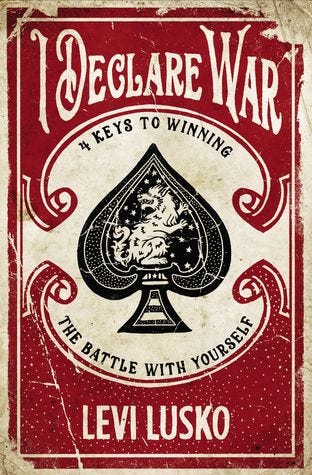
A Review of Levi Lusko's "I Declare War"
The War for Your Mind
![]()

In the age of Donald Trump as U.S. President, I came to this book with the expectation that somethin g called I Declare War would somehow be political, if not problematic. (See, I review bad books so you don't have to read them.) I don't know if I'm thankful and relieved to know that the title is culled from a much more innocent source, a children's card game. (I'm not much of a card player, so you can forgive and excuse me for not catching that reference off the top.) This is a book about laying down four cards at your disposal to eradicate bad habits, bad thoughts, bad things you say and so on to become a better human being. Self-improvement this book is, but seeing as though it comes from a Christian publisher, you know there's a God angle in here somewhere. That angle is that the fourth card is something of a lifeline to God. Feeling suicidal, as Lusko, the author, admits to sometimes feeling? Make a point of talking to God. It's that easy! Presto, majicko!
The truth of it is — while I enjoyed certain aspects of this book, which I'll go into a little later — this is a dangerous book in some ways. Make no mistake, laying your problems with God is a good thing and may be a little helpful. Waking up at 2 a.m. in cold sweats thinking you're going to die (which the author admits to doing) is probably best dealt with through therapy and/or medications. I suppose that makes me a proponent of science over God, though Lusko does quote science-y things at length in the first two-thirds of the book, but there it is. I honestly feel that suicidal thoughts are a big problem. Maybe not bigger than God can handle, but surely the last thing one would want to advise someone to do who is thinking of ending their life is simply to pray and memorize a few choice Bible quotes. (Lusko has provided a few of these in an appendix at the back of the book.) That's where I cross myself and say that I Declare War has its blind spots and may be more harmful than good in certain instances.
As more of a less spiritual self-help manual — the first three cards deal with minding your thoughts, minding your words and minding your deeds — the book is a little more successful. There are things in I Declare War that are, at the very least, interesting pieces of advice and may be helpful. However, I don't really recall them after reading this book. What I more easily recall are the stories that Lusko tells — some that succeed, some that don't. I found it fascinating, for instance, that the first U.S. man in space, Alan Shepard, wound up pissing himself while he was en route to being in orbit — and not because he was frightened, but because he spent more time on the launch pad than he thought he would. What the point of that story is, I'm not sure. (Maybe I wasn't reading this book closely enough?) There's also a tale where Lusko tries to jumpstart a car with the battery of another but reversed the polarities, which could have darned near killed him. The point? Again, I'm not so sure. The telling of that tale takes many pages, so by the time I reached the end of it, I probably kind of missed the point due to exhaustion.
That's a fundamental problem with I Declare War. Lusko loves to meander and go down rabbit holes where he can pontificate at length and go off on seemingly abstract tangents. I felt that the material in this book would have made for a solid, if a bit lengthy, infographic when you stripped everything down to its bare essentials. A lot of the words here feel like padding. Heck, there's even a section at the back where Lusko, falling in love with his research, regurgitates what he's given you in the book as scientific fact for no point other than to perhaps increase the page count. If you come to this title, be prepared for a bit of repetition and much beating over the head.
Now, I suppose this review is coming across as one big diss — which is sort of what's happening as I type these words, though I set out to be even-handed— but I do admire Lusko. He's the pastor of a series of churches that are active in a few U.S. states, and it's clear that Lusko can be funny and conversational as a writer. His books are easy to read, and, while we disagree on major theological points, he really knows his Bible. I wish that he could articulate that a little better in the pages. Perhaps the problem is, as he notes, is that he really wrestles with the page — going so far to reading things into a tape recorder to see if they sound good. I wonder if that kind of approach gets in the way of being an effective communicator who has a point with all of his points. Not to flog a dead horse here, but I still really don't see the point of the reversed polarity story in this work. In fact, I've walked away from this book not really feeling as though I've learned much of anything. A lot of what you'll find in I Declare War is just good ol' fashioned common sense, plumped out to be a book.
I wasn't too impressed with Lusko's last book, Swipe Right, but I believe in the Church of Second Chances. However, it appears that Lusko hasn't learned anything from writing that book. Here's something I wrote about Swipe Right (which I will admit wasn't one of my better reviews):
Lusko interjects various things happening in his life right as he's writing his words that don't seem to have much bearing on the subject at hand. He also starts the book with a memoir-esque story of being badly injured in a snowmobile accident, and somehow tries to draw a parallel between it and leading a Godly relationship life. I didn't get it.
And so it goes with I Declare War — Lusko tells stories with no discernible point other than simply telling the tale. He finds meaning in things that have happened to him where the actual meaning isn't very clear at all. He is making the same darn mistakes that he made in Swipe Right in I Declare War. If there's an argument to be made for reading other people's reviews as an author, this might be it. In any event, click-bait title or no, I Declare War succeeds only half-heartedly. Lusko is appealing when writing a self-help manual, with the caveat that he seems to undermine such things as suicidal thoughts by leaving the heavy lifting up to God on such matters. So does that make the book at all useful? It might be useful to some. However, I just found that there was enough lacking here to give this book a rightful pass. That title might lure you in if you're a Trump follower, but the message of the book is so small that it can fit in the palm of your hand or a few scrolls of the computer screen. Alas. This had the makings of something great.
Levi Lusko's I Declare War: Four Keys to Winning the Battle with Yourself was published by Thomas Nelson on October 30, 2018.
Of course, if you like what you see, please recommend this piece (click on the clapping hands icon below) and share it with your followers.
Get in touch: zacharyhoule@rogers.com
Posted by: virgilvirgilzareemskiea0252085.blogspot.com
Source: https://zachary-houle.medium.com/a-review-of-levi-luskos-i-declare-war-e3bd68fda011